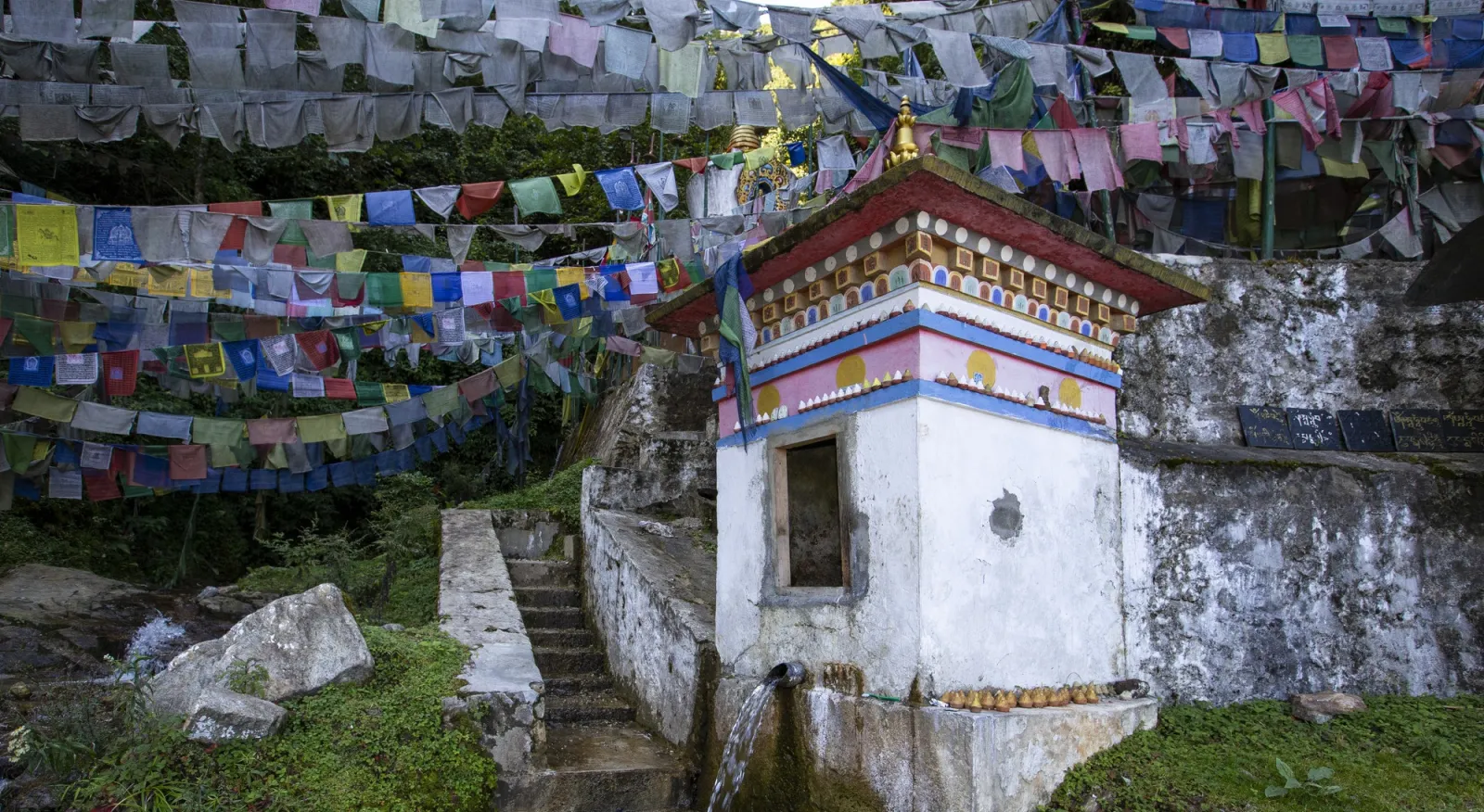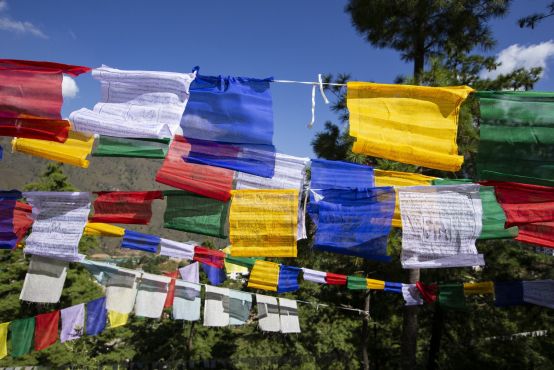
About Bhutan
Nestled in the Himalayas between India and China, and largely isolated from the rest of the world until the mid-twentieth century, the Kingdom of Bhutan is rich in cultural and environmental diversity.
Bhutan is known for measuring prosperity according to its own development philosophy – Gross National Happiness – which measures sustainable and equitable socio-economic growth, environmental conservation, the protection and promotion of traditional Bhutanese culture, and good governance.
Bhutan's early history is steeped in mythology. Around the 8th century BC Buddhism was introduced, and the country’s political history since has been closely tied to its religious history. Bhutan is one of the few countries that has been independent throughout its history, never conquered, occupied, or governed by an outside power.
In 1907, the country elected the first hereditary ruler of Bhutan. Following a series of political reforms, in the early 2000s the country transitioned to a more open, democratic constitutional monarchy. The King and Royal Family continue to play an important role in Bhutanese society.
The Bhutanese economy is primarily agrarian, with around 60% of the population engaged in agriculture, forestry and animal husbandry. The Ministry of Agriculture and Forests has supported farmers to set up cooperatives to easily market their farm products. More recently, the Bhutanese economy has been boosted by tourism and hydro energy.
While the standard of living in Bhutan has improved in recent years, approximately 12.4% of the population still lives below the poverty line. Most people in Bhutan have access to housing, and every village has access to amenities such as schools, basic health care, roads and electricity.
Plans are underway to connect even the remotest villages via a network of telecommunications. Despite the government’s active approach to development, Bhutan still faces several challenges. The kingdom is endeavouring to transition from an agrarian society to a tech-savvy 21st century country, yet a large proportion of the population still works in agriculture, predominantly in subsistence farming.
Australian volunteers have supported a range of Bhutanese partner organisations to achieve their development goals since 2013. The Australian Volunteers Program continues this rich history.
Learn more about the Australian Volunteer Program's work in Bhutan.
Key things to consider about volunteering in Bhutan
- Bhutan is known for its rich cultural heritage and adherence to traditional values. Bhutanese culture is deeply rooted in Buddhism, and there is a strong sense of community and tradition. Understanding and respecting customs and traditions is crucial.
- Learning the language, Dzongkha, can be beneficial. While Bhutanese people often speak English, especially in urban areas, learning Dzongkha, the official language, can greatly enhance your ability to communicate and connect with the community.
- Bhutan has a specific dress code, and both men and women are expected to wear the traditional Bhutanese attire in many public places. Understanding and adhering to these clothing customs is important for social acceptance. Our team will guide in-country volunteers on acquiring traditional attire.
- Bhutanese cuisine is distinctive and often includes spicy dishes. Being open to trying Bhutanese foods and understanding the dining etiquette can be a great way to bond with the community.
- Bhutan’s health care system is unique. It provides the option of both Allopathy and Traditional Bhutanese Medicine.
Learn what it's like to volunteer in Bhutan
Meet Yeshey, our Program Manager in Bhutan and find out what makes a successful volunteer.

Culture and religion
Volunteering in Bhutan is a unique experience. Your experience will be richer if you come with patience, flexibility, an open mind, and a sense of humour.
Religion
Bhutan is a Buddhist country and is considered one of the few remaining countries widely practising Vajrayana Buddhism. Approximately three-quarters of the Bhutanese population follow Vajrayana Buddhism, which is also the state religion. About a quarter of the population are Hindu. Other religions account for less than one per cent of the population.
Festivals provide an opportunity for you to truly experience Bhutanese culture. Every village is known for unique festivals. Food and traditional wine (Ara) are shared throughout the festivals.
Dress
A feature of Bhutanese daily life is the traditional national dress that Bhutanese wear. Men wear a Gho, while women wear a Kira, a long dress that reaches their ankles. In keeping with tradition, all Bhutanese wear scarves while visiting Dzongs (monastery and administrative centres).
Volunteers are expected to dress appropriately at any assignment related activity. Buttoned shirts for men, and blouses and skirts or dresses for women are appropriate attire. Volunteers working in government administration and schools are advised to wear national dress. Volunteers should always dress conservatively in Bhutan.
Language
Bhutan’s national language is Dzongkha, but over eighteen dialects are spoken across the country. The survival of such linguistic diversity is attributed to the geographical nature of the country. Volunteers are expected to learn some basic Dzongkha, but it is beneficial to become as proficient as possible.
The program provides funding to support language lessons. More information on this process will be available during the onboarding process.
Explore our Pride Guides
LGBTQIA+ program participants must be aware of the country's context before undertaking an assignment. Pride Guides are designed to introduce key issues related to people with diverse SOGISEC and their participation in the program.
Learn more
Day to day life
Climate
Bhutan is a land of steep and high mountains crisscrossed by a network of swift rivers forming deep valleys. Elevation rises from 200 meters in the southern foothills to more than 7,000 meters in the north. The climate in Bhutan varies with elevation, from subtropical in the south to temperate in the highlands and year-round snow in the north. Bhutan experiences four distinct seasons: summer, autumn, winter and spring.
It is important to note the effects of climate change on day-to-day life and weather patterns in Bhutan. This will look different based on location. According to the World Bank flooding is the most significant climate-related hazard to Bhutan. Climate models also predict an increase in heatwaves and droughts.
Telecommunications
Telecommunications access in Bhutan is reliable across mobile and internet services. The current coverage available is 4G. There are also several internet cafes in the urban town area of Thimphu, and some restaurants and coffee shops have complimentary Wi-Fi.
Food and dining
The staple diet in Bhutan is rice, usually accompanied by meat and vegetable dishes. The most common meats are beef, chicken and pork. There are numerous restaurants and cafes in Thimphu and Paro.
Finding basic groceries is straightforward. If you have strict dietary requirements, such a vegan or gluten free, it will be more challenging to find some items. You should bring a small stock of products you need immediately, and then arrange local suppliers to import them.
Accommodation
The most affordable and suitable housing options in Thimphu and Paro are apartments in building complexes. The apartments usually have two to three bedrooms, two bathrooms, a living room, kitchen and a storage room. Finding rental space is very difficult and bookings need to be made two to three months in advance. The country office team will support you as best possible to find accommodation before you arrive.
Find out about our in-country allowances
Transport
There are inter-city buses in Thimphu and the service is improving. Currently buses are often overcrowded and run to unreliable schedules. Taxis are generally safe and affordable.
Personal safety
When it comes to your safety and security you must be willing to adapt your behaviour and lifestyle to minimise the potential for being a target of crime. Like anywhere in the world, crime does exist in Bhutan.
Petty theft and burglaries are not uncommon. You should always be aware of your environment and take necessary precautions. You can reduce your risk of becoming a target by avoiding situations that make you feel uncomfortable and by taking advance precautions.
Dog attacks are common – avoid areas with large groups of dogs and carry an umbrella or stick (even a dog alarm) to protect yourself and shout for help from passers-by. The main hospital will provide free rabies shots if bitten.
Personal safety issues constantly evolve, and we recommend you keep an eye on Smart Traveller for current information.
Mobility and accessibility
We’re committed to ensuring that international volunteering is inclusive and accessible to Australians from a range of backgrounds, with diverse perspectives, identities and abilities.
To support this, Access and Inclusion Plans are available for volunteers with disabilities to assess their needs and ensure their living and working requirements are fully considered. Indigenous Pathways is an Indigenous-led program that focuses on providing culturally safe, flexible and tailored support for Aboriginal and Torres Strait Islander volunteers.
Before applying for a volunteering assignment in Bhutan, please do some further research on living in Bhutan and the organisation you are hoping to volunteer with. Successful applicants will have the opportunity to discuss expected living and working arrangements with their recruitment officer.
Volunteering opportunities in Bhutan
There are no current assignments in Bhutan, but we’re always adding new assignments. Stay up to date with our Assignment Alert newsletter or register for the Talent Pool to get a head start on your application. Alternatively, explore all our current assignments.